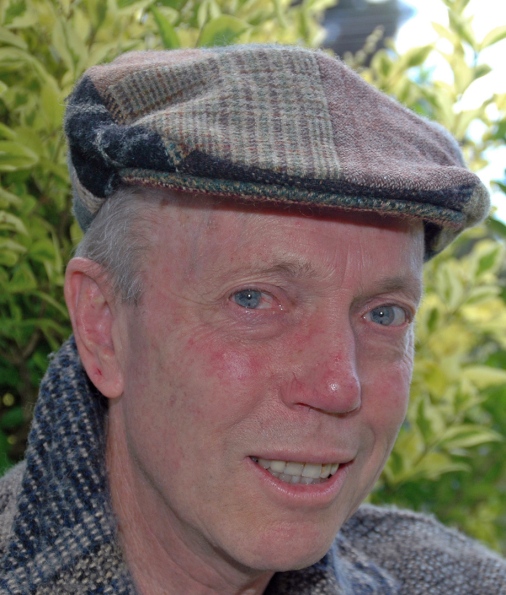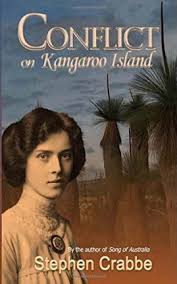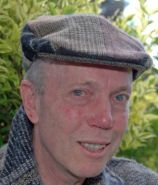
Welcome to Tea with Mrs B, an author interview series. Here to share a pot of tea and to chat about his latest book, Conflict on Kangaroo Island, is Stephen Crabbe.

Stephen Crabbe was born in Adelaide, South Australia. His ancestors were among the earliest colonists.
Stephen’s twin passions from the earliest years were music and language in all its forms. He studied classical pianoforte from the age of five and read widely in English literature. He also loved to explore all other languages.
Stephen took up education as a profession, which took him into both public and private schools in several different roles. Eventually he chose to be a music educator, a vocation he followed for several decades.
Writing was always a compulsion for Stephen, but in later years it drew more attention. Screen productions used his scripts and many of his articles were published online and in print. The main focus of his writing now is fiction, especially of the historical kind.
He lives in the rural south-west of Australia.
Hello Stephen. It is my pleasure to welcome to my blog, Mrs B’s Book Reviews and thank you for joining me for Tea with Mrs B, an author interview series. To set the mood for our tea infused interview, what is your preferred beverage, tea, coffee or other? And side accompaniment, scone, cake or other?
Thank you, Mrs B! Well now, I suppose it depends on the time of day. Coffee after breakfast—home-ground, made with a plunger and sweetened with a little honey. Other times I prefer herbal teas. And so, let’s go with a strong infusion of rosehips, if you have it. Or peppermint? No, nothing on the side, thanks.
Can you tell us what genres you write for and how many books you have had published?
Although I have ideas for stories in three or four genres, my books so far focus on historical fiction. The era is 1913 to 1918 and the place is South Australia. The first two have been published in the last five years and the third will soon be ready to visit the editor.
Conflict on Kangaroo Island is your latest release. Can you describe the book in just a sentence?
Where mainlanders saw a paradise, Pansy Pearce saw greed, resentment and secret malevolence—and she couldn’t keep her nose out of it.
What came first in the creation of the novel – the title, plot, characters or setting when you first set out to write Conflict on Kangaroo Island?
My initial ideas for stories come from all sorts of angles but, in this case, it was from the setting. Kangaroo Island is a beautiful and unique natural environment with a fascinating, partly veiled history, in which I found the events and issues that led to the premise for this story.
How long did it take you to write Conflict on Kangaroo Island?
I started in January 2014 and it was published in July 2016, but I can’t enumerate the hours of work. The project seemed all-consuming at times.
Can you tell us about the inspiration behind the characters that feature in your novel?
As a long-time student of South Australian history, I was inspired by the huge push for equal status for women in that State. Considered in a global context, late nineteenth and early twentieth century SA was unique in some of the manifestations of this push. There was also a vociferous sector of the community proclaiming the virtues of a scientific approach to social and environmental issues, but some of the views advocated were, in hindsight, highly questionable. My characters were inspired by various Individuals involved in this maelstrom of opinions, protests and crusades.
Did you need to undertake any research to bring Conflict on Kangaroo Island to life? How did you incorporate this research into your book?
Any research? Mrs B, are you kidding? Before, during and after writing the story, I was immersed in old newspapers and history books about South Australian matters in general and the island in particular. It’s not a matter of incorporating the research material into the book; rather, the novel grows out of the research. For historical novelists, research is central to the work, and it’s deeply fascinating. In fact, some of us would argue that the novel is actually an excuse for doing the research!
What do you hope readers will take away from reading Conflict on Kangaroo Island?
If the novel makes people fond of Kangaroo Island’s natural environment even if they’ve never visited it physically, I would be pleased. But I would erupt with sheer delight if readers made the connection between social, political and ecological issues of today and those the novel touches upon.
What writers have inspired you along the way to publication?
Since my school primer in Grade One, I’ve read very widely. Back then it was Biggles, Enid Blyton, Louisa May Alcott, Robert L. Stevenson, R.M. Ballantyne and their ilk. Later I found the Greek and Roman classics, the English Victorian novelists, Australia’s Henry Lawson and H.H. Richardson and those new Aussie novelists who were bursting into prominence in the decades after the Second World War. After that? Well, there was Updike and Salinger, a whole host of British and Canadian authors, then more Aussies. I read translations of Guy de Maupassant, Italo Calvino, Umberto Eco … Look, I could fill the page with these names, but the point is I cannot pick out any individuals as special influences in my own writing. They might have all taught me something or other, most of that happening unconsciously.
Aside from writing, do you have any interesting hobbies?
As I’ve indicated, I’m an avid reader and always have been; it’s crucial for learning to write and for sustaining and improving one’s output. But I also have a life-time interest in music, from beginning piano lessons at the age of five, progressing through examinations for many years and then finding a career as a teacher of music myself until a few years ago. These days it’s a hobby; I’m simply an enthusiastic audience. I’ve always been a very keen sportsman too. Even now, in my seventies, I compete in Masters’ Athletics with a few medals to my name.
What is next on the horizon for Stephen Crabbe? Do you have any writing projects you would like to share with us?
I’m putting the finishing touches to a novel before sending it to my editor. It combines characters from my two published works and intertwines their experiences during the First World War in South Australia. As it stands, the book will be much longer than its predecessors, weaving a variety of threads together into what I think will be a really engrossing read. I’m hoping it will be released later this year. After that? I’m considering the options, but I think a novel set in the 1950s might push its way onto my desk. And I’d like to return to writing some poetry, which I’ve had to put aside for a long time.
What 2019 book releases are you most excited to read?
Heavens, Mrs B.! How will I choose? There are so many I would love to read, but there’s so little time and I’m a slow reader. I read the way I eat—chewing on each morsel for a long time to extract all it can give. I know I have a lot of books still to be read on my Kindle. Maybe I need to catch up there before looking at 2019 publications.
Finally, wrapping up our tea themed interview, who would you most like to share a pot of tea with?
There’s an outstanding author in Adelaide, South Australia, I’d love to chat with over many pots. Her name’s Meredith Whitford. I’ve read two of her novels so far, and they’re absolutely enthralling. Love’s Will brings William Shakespeare to life as he wrangles with his tumultuous relationships. What a read that is! And another novel, Missing Christina, is a deeply engrossing narrative based on a real-life disappearance of a woman in Adelaide. I’d love to discuss with Meredith how she put those books together. If I could manage to get across the Nullarbor soon, I’d be setting up a date for tea with her. Anyway Mrs B., I’ve really enjoyed this cuppa and the conversation. Thank you!
Thank you for taking the time to visit Mrs B’s Book Reviews for Tea with Mrs B Stephen. Congratulations on the publication of Conflict on Kangaroo Island!
Conflict on Kangaroo Island takes place in 1913 in South Australia, when talk of war in  Europe is intensifying, and Germany is both customer and potential enemy of the island’s resources. Mystery and suspense, history and fascinating characters form an enthralling whole.
Europe is intensifying, and Germany is both customer and potential enemy of the island’s resources. Mystery and suspense, history and fascinating characters form an enthralling whole.
‘You certainly have a habit of nosing your way into other people’s business!’ Sergeant Lawrence of the Kangaroo Island police sees Pansy Pearce as an annoying busybody, and many others agree.
Ugly strife on the island is already causing conflict between farmers and those aiming to preserve indigenous species. When this inquisitive yet compassionate young woman tries to defend victims of ignorance, social prejudice and violence, she finds herself in clashes on several fronts. But real danger threatens when she steps into the mysterious affairs of the Dodd family; while Pansy fights a secret internal battle of identity.
Purchase Links: Amazon Book Depository
 Connect with Stephen here:
Connect with Stephen here:
Website
Goodreads


